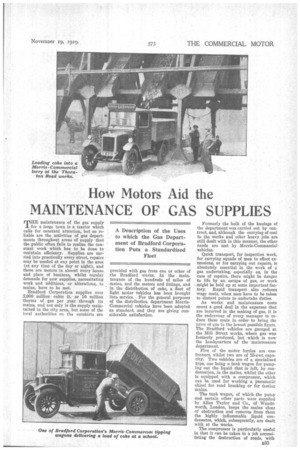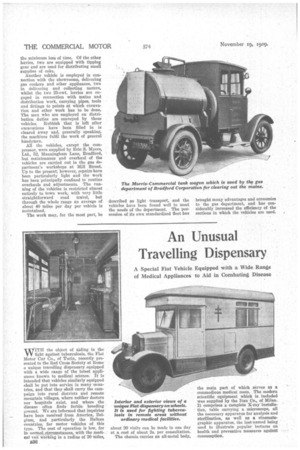How Motors Aid the MAINTENANCE OF GAS SUPPLIES
Page 69

Page 70

If you've noticed an error in this article please click here to report it so we can fix it.
THE maintenance of the gas supply for a large town is a matter which calls for constant attention, but so reliable are the activities of gas departments throughout areas of supply that the public often fails to realize the constant work which has to be done to maintain efficiency. Supplies are carried into practically every street, repairs may be needed at any point in the area (at any time of the day or night), and there are meters in almost every house and place of business whilst regular demands for new supplies, necessitating work and additions, or alterations, to mains have to be met.
Bradford Corporation supplies over 2,000 million cubic ft. or 10 million therms of gas per year through its mains, and not only is the supply maintained in the city area,, but some of the local authorities on the outskirts are provided with gas from one or other of the Bradford works. In the maintenance of the hundreds of miles of mains, and the meters and fittings, and in the distribution of coke, a fleet of light motor Vehicles has been brought into service. For the general purposes of the distribution department MorrisCommercial vehicles have been adopted as standard, and they are giving considerable satisfaction. Formerly the bulk of the haulage of the department was carried out by contract, and, although the carrying of coal to the works and other heavy jobs are still dealt with in this manner, the other needs are met by Morris-Commercial vehicles.
Quick transport, for inspection work, for carrying squads of men to effect extensions, or for carrying out repairs, is absolutely essential in the work of a gas undertaking, especially as, in the case of repairs, there might be danger to life by an escape of gas, or work might be held up at some important factory. Rapid transport also reduces wage costs, when men have to be taken to distant points to undertake duties.
As works and maintenance costs count a good deal in the expenses that are incurred in the making of gas, it is the endeavour of every manager to reduce these costs in order to bring the price of gas to the lowest possible figure. The Bradford vehicles are garaged at the Mill Street works, where gas was formerly produced, but which is now the headquarters of the maintenance department.
Five of the motor lorries are onetonners, whilst two are of 25-cwt. capacity. Two vehicles are of a specialized type, one being a tank wagon for pumping out the liquid that is left, by condensation, in the mains, whilst the other is equipped with a compressor, which can be used for working a pneumatic chisel for road breaking or for testing mains.
The tank wagon, of which the pump and certain other parts were supplied by Allan Taylor and Co., of Wandsworth, London, keeps the mains clear of obstruction and removes from them the highly inflammable liquid condensates, which, subsequently, are dealt with at the works.
The compressor is particularly useful in that it can be taken to a job necessitating the destruction of roads, with the minimum loss of time. Of the other lorries, two are equipped with tipping gear and are used for distributing small supplies of coke.
Another vehicle is employed in connection with the showrooms, delivering gas cookers and other appliances, two in delivering and collecting meters, whilst the two 25-cwt. lorries are engaged in connection with mains and distribution work, carrying pipes, tools and fittings to points at which excavation and other work has to be done. The men who are employed on distribution duties are conveyed by these vehicles. Rubbish that is left after excavations have been filled in is cleared away and, generally speaking. the machines fulfil the work of general handymen.
All the vehicles, except the compressor, were supplied by Eric S. Myers, Ltd., 52, Mauningham Lane Bradford, but maintenance and overhaul of the vehicles are carried out in the gas department's workshops at Mill Street. Up to the present, however, repairs have been particularly light and the work has been principally confined to routine overhauls and adjustments. The running of the vehicles is restricted almost entirely to town work, with very little straightforward road travel, but through the whole range an average of about 40 miles per day per vehicle is maintained.
The work may, for the most part, be described as light transport, and the vehicles have been found well to meet the needs of the department. The possession of its own standardized fleet has brought many advantages and economies to the gas department, and has considerably increased the efficiency of the sections in which the vehicles are used.




















































































































